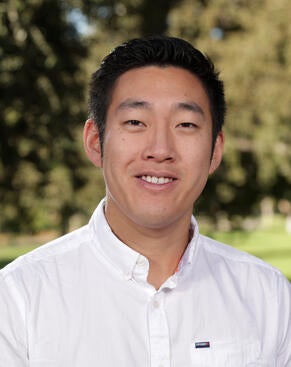The Research Corporation for Science Advancement, or RCSA, is welcoming Timothy Su, UCR assistant chemistry professor, to its 2024 class of Cottrell Scholar awardees.
The prestigious award recognizes early career scholars in chemistry, physics, and astronomy, who are chosen through a rigorous peer-reviewed process of applications from universities across the U.S. and Canada. Each awardee receives $120,000. There are 19 members of this year’s class.
The RCSA is a private foundation that funds innovative scientific research and the development of academic scientists. “For more than 100 years, RCSA has been characterized by programs and initiatives that blaze a trail to where science is going,” said a foundation statement.
A UC alumnus, Su received a bachelor’s degree in chemistry from UC Berkeley in 2011 and a doctorate from Columbia University in 2016. He came to UCR in 2019 as an assistant professor, where his laboratory explores the intersection between silicon chemistry, atomically precise materials, and molecular electronics.
“We figure out how to make new molecules that have never been made before, then wire them up into single-molecule circuits to explore quantum electronic transport phenomena that emerge only at the molecular length scale,” Su said.
Over the last few years at UCR, Su’s laboratory has developed a new class of materials called silicon diamondoid clusters, which are the smallest fundamental units of crystalline silicon.
The Cottrell Award will allow Su to expand ongoing efforts to precisely install certain atoms into silicon diamondoids using rationally designed synthetic chemistry approaches. The goal is to enhance electronic transport properties, which would result in more powerful and efficient electronics.
“It’s a great honor to receive this award and join a cohort of scholars who I have long admired for both their cutting-edge research ideas and educational initiatives,” Su said.
The award will not only support Su’s research, but also some of his innovative teaching strategies. These include the creation of student-produced social media videos on platforms like TikTok, which help students view abstract chemical concepts as being fun and relatable.
Su reports that the videos have led to tangible improvements in exam performance, while reaching broad online audiences with over 3 million total video views.
Supported with funds from his award, Su plans to study the specific mechanisms through which the videos boost classroom achievement. The award will also allow him to broaden the scope of the videos to teach students about STEM careers and about chemistry research at UCR.
“I am deeply thankful to work with the talented UCR students in my research group whose efforts made this award possible,” he said. “I am also grateful to teach the vibrant undergraduates in my general chemistry course, who have embraced new forms of chemistry curricula and provided me with valuable feedback on the impact of my educational activities.”
